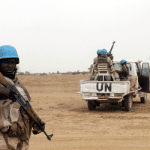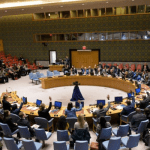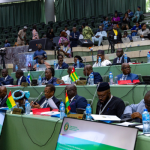The UN peacekeeping mission in Mali said it has accelerated its scheduled evacuation from the northern Mali town of Ber due to worsening security, as fighting in the area stoked fears of a resurgence of a separatist movement.
The Tuareg-led Coordination of Azawad Movements (CMA) has accused Malian soldiers and Russian Wagner troops of breaking a ceasefire by targeting its fighters stationed near Ber in recent days.
The Malian army has not replied to the charges, but said that six of its soldiers stationed in Ber were killed while resisting an incursion by undefined “armed terrorist groups.”
The clashes follow Mali’s unexpected demand in June for MINUSMA to end its decade-long mission, raising concerns its departure could put further strain on a 2015 peace deal with Tuareg rebels and weaken efforts to curb an insurgency.
Fighting between CMA forces and Malian troops around Ber was ongoing as of Sunday morning, CMA spokesperson Mohamed Elmaouloud Ramadane, said.
The presence of MINUSMA peacekeepers had helped to placate the Tuareg-led rebels, who halted their separatist uprising with the 2015 Algiers Accord.
Unrest in the region began in Mali in 2012, when terrorists hijacked the Tuareg’s uprising.
The insurgency has since spread into neighbouring Burkina Faso and Niger, killing thousands of people and displacing millions in one of the world’s worst humanitarian crises.
The violence has also exacerbated political unrest, allowing the Malian junta to grab power in coups in 2020 and 2021.
It has since joined forces with Russia’s Wagner mercenary group, which has roughly 1,000 men in Mali.
Malian military and their foreign security partners, suspected to be Wagner mercenaries, have used “grave human rights abuses” such as brutality against women to spread terror, according to a new assessment by U.N. sanctions monitors.
The UN peacekeeping mission in Mali said it has accelerated its scheduled evacuation from the northern Mali town of Ber due to worsening security, as fighting in the area stoked fears of a resurgence of a separatist movement.
The Tuareg-led Coordination of Azawad Movements (CMA) has accused Malian soldiers and Russian Wagner troops of breaking a ceasefire by targeting its fighters stationed near Ber in recent days.
The Malian army has not replied to the charges, but said that six of its soldiers stationed in Ber were killed while resisting an incursion by undefined “armed terrorist groups.”
The clashes follow Mali’s unexpected demand in June for MINUSMA to end its decade-long mission, raising concerns its departure could put further strain on a 2015 peace deal with Tuareg rebels and weaken efforts to curb an insurgency.
Fighting between CMA forces and Malian troops around Ber was ongoing as of Sunday morning, CMA spokesperson Mohamed Elmaouloud Ramadane, said.
The presence of MINUSMA peacekeepers had helped to placate the Tuareg-led rebels, who halted their separatist uprising with the 2015 Algiers Accord.
Unrest in the region began in Mali in 2012, when terrorists hijacked the Tuareg’s uprising.
The insurgency has since spread into neighbouring Burkina Faso and Niger, killing thousands of people and displacing millions in one of the world’s worst humanitarian crises.
The violence has also exacerbated political unrest, allowing the Malian junta to grab power in coups in 2020 and 2021.
It has since joined forces with Russia’s Wagner mercenary group, which has roughly 1,000 men in Mali.
Malian military and their foreign security partners, suspected to be Wagner mercenaries, have used “grave human rights abuses” such as brutality against women to spread terror, according to a new assessment by U.N. sanctions monitors.
The UN peacekeeping mission in Mali said it has accelerated its scheduled evacuation from the northern Mali town of Ber due to worsening security, as fighting in the area stoked fears of a resurgence of a separatist movement.
The Tuareg-led Coordination of Azawad Movements (CMA) has accused Malian soldiers and Russian Wagner troops of breaking a ceasefire by targeting its fighters stationed near Ber in recent days.
The Malian army has not replied to the charges, but said that six of its soldiers stationed in Ber were killed while resisting an incursion by undefined “armed terrorist groups.”
The clashes follow Mali’s unexpected demand in June for MINUSMA to end its decade-long mission, raising concerns its departure could put further strain on a 2015 peace deal with Tuareg rebels and weaken efforts to curb an insurgency.
Fighting between CMA forces and Malian troops around Ber was ongoing as of Sunday morning, CMA spokesperson Mohamed Elmaouloud Ramadane, said.
The presence of MINUSMA peacekeepers had helped to placate the Tuareg-led rebels, who halted their separatist uprising with the 2015 Algiers Accord.
Unrest in the region began in Mali in 2012, when terrorists hijacked the Tuareg’s uprising.
The insurgency has since spread into neighbouring Burkina Faso and Niger, killing thousands of people and displacing millions in one of the world’s worst humanitarian crises.
The violence has also exacerbated political unrest, allowing the Malian junta to grab power in coups in 2020 and 2021.
It has since joined forces with Russia’s Wagner mercenary group, which has roughly 1,000 men in Mali.
Malian military and their foreign security partners, suspected to be Wagner mercenaries, have used “grave human rights abuses” such as brutality against women to spread terror, according to a new assessment by U.N. sanctions monitors.
The UN peacekeeping mission in Mali said it has accelerated its scheduled evacuation from the northern Mali town of Ber due to worsening security, as fighting in the area stoked fears of a resurgence of a separatist movement.
The Tuareg-led Coordination of Azawad Movements (CMA) has accused Malian soldiers and Russian Wagner troops of breaking a ceasefire by targeting its fighters stationed near Ber in recent days.
The Malian army has not replied to the charges, but said that six of its soldiers stationed in Ber were killed while resisting an incursion by undefined “armed terrorist groups.”
The clashes follow Mali’s unexpected demand in June for MINUSMA to end its decade-long mission, raising concerns its departure could put further strain on a 2015 peace deal with Tuareg rebels and weaken efforts to curb an insurgency.
Fighting between CMA forces and Malian troops around Ber was ongoing as of Sunday morning, CMA spokesperson Mohamed Elmaouloud Ramadane, said.
The presence of MINUSMA peacekeepers had helped to placate the Tuareg-led rebels, who halted their separatist uprising with the 2015 Algiers Accord.
Unrest in the region began in Mali in 2012, when terrorists hijacked the Tuareg’s uprising.
The insurgency has since spread into neighbouring Burkina Faso and Niger, killing thousands of people and displacing millions in one of the world’s worst humanitarian crises.
The violence has also exacerbated political unrest, allowing the Malian junta to grab power in coups in 2020 and 2021.
It has since joined forces with Russia’s Wagner mercenary group, which has roughly 1,000 men in Mali.
Malian military and their foreign security partners, suspected to be Wagner mercenaries, have used “grave human rights abuses” such as brutality against women to spread terror, according to a new assessment by U.N. sanctions monitors.
The UN peacekeeping mission in Mali said it has accelerated its scheduled evacuation from the northern Mali town of Ber due to worsening security, as fighting in the area stoked fears of a resurgence of a separatist movement.
The Tuareg-led Coordination of Azawad Movements (CMA) has accused Malian soldiers and Russian Wagner troops of breaking a ceasefire by targeting its fighters stationed near Ber in recent days.
The Malian army has not replied to the charges, but said that six of its soldiers stationed in Ber were killed while resisting an incursion by undefined “armed terrorist groups.”
The clashes follow Mali’s unexpected demand in June for MINUSMA to end its decade-long mission, raising concerns its departure could put further strain on a 2015 peace deal with Tuareg rebels and weaken efforts to curb an insurgency.
Fighting between CMA forces and Malian troops around Ber was ongoing as of Sunday morning, CMA spokesperson Mohamed Elmaouloud Ramadane, said.
The presence of MINUSMA peacekeepers had helped to placate the Tuareg-led rebels, who halted their separatist uprising with the 2015 Algiers Accord.
Unrest in the region began in Mali in 2012, when terrorists hijacked the Tuareg’s uprising.
The insurgency has since spread into neighbouring Burkina Faso and Niger, killing thousands of people and displacing millions in one of the world’s worst humanitarian crises.
The violence has also exacerbated political unrest, allowing the Malian junta to grab power in coups in 2020 and 2021.
It has since joined forces with Russia’s Wagner mercenary group, which has roughly 1,000 men in Mali.
Malian military and their foreign security partners, suspected to be Wagner mercenaries, have used “grave human rights abuses” such as brutality against women to spread terror, according to a new assessment by U.N. sanctions monitors.
The UN peacekeeping mission in Mali said it has accelerated its scheduled evacuation from the northern Mali town of Ber due to worsening security, as fighting in the area stoked fears of a resurgence of a separatist movement.
The Tuareg-led Coordination of Azawad Movements (CMA) has accused Malian soldiers and Russian Wagner troops of breaking a ceasefire by targeting its fighters stationed near Ber in recent days.
The Malian army has not replied to the charges, but said that six of its soldiers stationed in Ber were killed while resisting an incursion by undefined “armed terrorist groups.”
The clashes follow Mali’s unexpected demand in June for MINUSMA to end its decade-long mission, raising concerns its departure could put further strain on a 2015 peace deal with Tuareg rebels and weaken efforts to curb an insurgency.
Fighting between CMA forces and Malian troops around Ber was ongoing as of Sunday morning, CMA spokesperson Mohamed Elmaouloud Ramadane, said.
The presence of MINUSMA peacekeepers had helped to placate the Tuareg-led rebels, who halted their separatist uprising with the 2015 Algiers Accord.
Unrest in the region began in Mali in 2012, when terrorists hijacked the Tuareg’s uprising.
The insurgency has since spread into neighbouring Burkina Faso and Niger, killing thousands of people and displacing millions in one of the world’s worst humanitarian crises.
The violence has also exacerbated political unrest, allowing the Malian junta to grab power in coups in 2020 and 2021.
It has since joined forces with Russia’s Wagner mercenary group, which has roughly 1,000 men in Mali.
Malian military and their foreign security partners, suspected to be Wagner mercenaries, have used “grave human rights abuses” such as brutality against women to spread terror, according to a new assessment by U.N. sanctions monitors.
The UN peacekeeping mission in Mali said it has accelerated its scheduled evacuation from the northern Mali town of Ber due to worsening security, as fighting in the area stoked fears of a resurgence of a separatist movement.
The Tuareg-led Coordination of Azawad Movements (CMA) has accused Malian soldiers and Russian Wagner troops of breaking a ceasefire by targeting its fighters stationed near Ber in recent days.
The Malian army has not replied to the charges, but said that six of its soldiers stationed in Ber were killed while resisting an incursion by undefined “armed terrorist groups.”
The clashes follow Mali’s unexpected demand in June for MINUSMA to end its decade-long mission, raising concerns its departure could put further strain on a 2015 peace deal with Tuareg rebels and weaken efforts to curb an insurgency.
Fighting between CMA forces and Malian troops around Ber was ongoing as of Sunday morning, CMA spokesperson Mohamed Elmaouloud Ramadane, said.
The presence of MINUSMA peacekeepers had helped to placate the Tuareg-led rebels, who halted their separatist uprising with the 2015 Algiers Accord.
Unrest in the region began in Mali in 2012, when terrorists hijacked the Tuareg’s uprising.
The insurgency has since spread into neighbouring Burkina Faso and Niger, killing thousands of people and displacing millions in one of the world’s worst humanitarian crises.
The violence has also exacerbated political unrest, allowing the Malian junta to grab power in coups in 2020 and 2021.
It has since joined forces with Russia’s Wagner mercenary group, which has roughly 1,000 men in Mali.
Malian military and their foreign security partners, suspected to be Wagner mercenaries, have used “grave human rights abuses” such as brutality against women to spread terror, according to a new assessment by U.N. sanctions monitors.
The UN peacekeeping mission in Mali said it has accelerated its scheduled evacuation from the northern Mali town of Ber due to worsening security, as fighting in the area stoked fears of a resurgence of a separatist movement.
The Tuareg-led Coordination of Azawad Movements (CMA) has accused Malian soldiers and Russian Wagner troops of breaking a ceasefire by targeting its fighters stationed near Ber in recent days.
The Malian army has not replied to the charges, but said that six of its soldiers stationed in Ber were killed while resisting an incursion by undefined “armed terrorist groups.”
The clashes follow Mali’s unexpected demand in June for MINUSMA to end its decade-long mission, raising concerns its departure could put further strain on a 2015 peace deal with Tuareg rebels and weaken efforts to curb an insurgency.
Fighting between CMA forces and Malian troops around Ber was ongoing as of Sunday morning, CMA spokesperson Mohamed Elmaouloud Ramadane, said.
The presence of MINUSMA peacekeepers had helped to placate the Tuareg-led rebels, who halted their separatist uprising with the 2015 Algiers Accord.
Unrest in the region began in Mali in 2012, when terrorists hijacked the Tuareg’s uprising.
The insurgency has since spread into neighbouring Burkina Faso and Niger, killing thousands of people and displacing millions in one of the world’s worst humanitarian crises.
The violence has also exacerbated political unrest, allowing the Malian junta to grab power in coups in 2020 and 2021.
It has since joined forces with Russia’s Wagner mercenary group, which has roughly 1,000 men in Mali.
Malian military and their foreign security partners, suspected to be Wagner mercenaries, have used “grave human rights abuses” such as brutality against women to spread terror, according to a new assessment by U.N. sanctions monitors.














